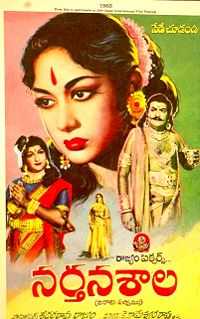Kamalakara Kameswara Rao
| Kamalakara Kameswara Rao | |
|---|---|
| Born |
4 October 1911 Machilipatnam, Andhra Pradesh |
| Died |
29 June 1998 Nellore, Andhra Pradesh |
| Occupation | Film direction |
| Nationality | Indian |
| Ethnicity | Hindu |
| Citizenship | India |
| Education | Bachelor of Arts |
| Alma mater | Noble College, Machilipatnam |
| Period | 1940s to 1980s |
| Genres | Journalist, Writer, Director |
| Notable work(s) | Nartanasala |
K. Kameswara Rao or Kamalakara Kameswara Rao (Telugu: కమలాకర కామేశ్వరరావు) BA (b: 14 October 1911 - d: 29 June 1998) is famous Indian film director popularly known as Pouraanika Chitra Brahma.[1] He has directed about 50 films in Telugu and Tamil languages, majority of them are Mythological in nature. The most renowned among them is Nartanasala.
Life Sketch
He was born in 1911 in Machilipatnam. He has completed Bachelor of Arts from the Noble College, Machilipatnam. He has worked as a Film journalist for Krishna Patrika between 1934 and 1937. His unbiased reviews about the released films are highly appreciated by the audiences.[2] On invitation from H. M. Reddy, he has reached Madras. He has joined as assistant director and worked with K. V. Reddy and Moola Narayana Swamy for the film Gruhalakshmi in 1938. He has worked as assistant director for the films Vande Mataram, Sumangali, Devatha and Swarga Seema under Bomireddi Narasimha Reddy and for Bhakta Potana and Yogi Vemana under Kadiri Venkata Reddy. After observing him closely, Vijaya Pictures has given the responsibility of independently direct Chandraharam in 1954. He has left Vijaya pictures in 1955. He has directed about 30 films of National Art Theatres, Rajyam Pictures, Ponnaloori Brothers, Padmalaya Pictures, Mahija pictures and Suresh Productions over the period of three decades.

He used to describe the film Nartanasala (1963) as his best directoral work, which won many National and International awards. He died at the age of 88 years on 29 June 1998.
Filmography
- Gruhalakshmi (1938) (assistant director)
- Vande Mataram (1939) (assistant director)
- Sumangali (1940) (assistant director)
- Devatha (1941) (assistant director)
- Bhakta Potana (1942) (assistant director)
- Swargaseema (1945) (assistant director)
- Yogi Vemana (1947) (assistant director)
- Gunasundari Katha (1949) (screen adaptation)
- Patala Bhairavi (1951) (screen adaptation)
- Chandraharam (Tamil, 1953) (director)
- Chandraharam (Telugu, 1954) (director)
- Guna Sundari (1955) (director)
- Penki Pellam (1956) (director)
- Panduranga Mahatyam (1957) (director)
- Sobha (1958) (director)
- Pachai Malai Kurathi (1959) (director)
- Raja Sevai (1959) (director)
- Rechukka Pragatichukka (1959) (director)
- Mahakavi Kalidasu (Tamil, 1960) (director)
- Mahakavi Kalidasu (Telugu, 1960) (director)
- Pandava Vanavasam (Tamil, 1961) (director)
- Mahamantri Timmarusu (1962) (director)
- Gundamma Katha (1962) (director)
- Narthanasala (1963) (director)
- Pandava Vanavasam (Telugu, 1965) (director)
- Shakuntala (1966) (director)
- Sri Krishna Tulabharam (Tamil, 1966) (director)
- Sri Krishna Tulabharam (Telugu, 1966) (director)
- Kambojaraju Katha (1967) (director)
- Sri Krishnavataram (Tamil, 1967) (director)
- Sri Krishnavataram (Telugu, 1967) (director)
- Kalasina Manushulu (1968) (director)
- Veeranjaneya (1968) (director)
- Sri Seeta Rama Hanuman (1969) (director)
- Mayani Mamata (1970) (director)
- Sri Krishna Vijayam (1970) (director)
- Bala Bharatam (1972) (director)
- Jeevithasayam (1974) (director)
- Kurukshetramu (1977) (director)
- Seeta Rama Vanavasam (1977) (director)
- Sri Raam Vanavas (Hindi, 1977) (director)
- Gnana kuzhandhai (1979) (director)
- Sri Vinayaka Vijayam (1980) (director)
- Sri Vasavi Kanyaka Parameswari Mahatyam (1980) (director)
- Daiva Thirumanangal (1981) (director)
- Ekalavya (1982) (director)
- Santoshi Mata Vratha Mahatyam (1983) (director)
- Badarinatha Darsanam (1985) (director)
- Sri Datta Darsanam (1985) (director)
- Ashtalakshmi Vaibhavamu (1986) (director)
- Devi Navagraha Nayaki (1986) (director)
- Edu Kondalaswamy (1991) (director)
Awards
- National Film Award for Second Best Feature Film in 1964 - Nartanasala.
- 1962: President's Silver Medal for Best Feature Film in Telugu - Mahamantri Timmarusu[3]
- 1960: President's Silver Medal for Best Feature Film in Telugu - Mahakavi Kalidasu[4]
- Other Awards
- Nartanasala has been screened in Jakarta International Film Festival. S. V. Ranga Rao won the best actor award and T. V. S. Sharma the best art director award.
References
- ↑ Kameswara Rao, Kamalakara, Luminaries of 20th Century, Part I, Potti Sriramulu Telugu University, Hyderabad, 2005, pp: 74-5.
- ↑ Kamalakara Kameswara Rao Jayanthi Today at Cinegoer.com
- ↑ "10th National Film Awards". International Film Festival of India. Retrieved September 9, 2011.
- ↑ "8th National Film Awards". International Film Festival of India. Retrieved September 7, 2011.
External links
|